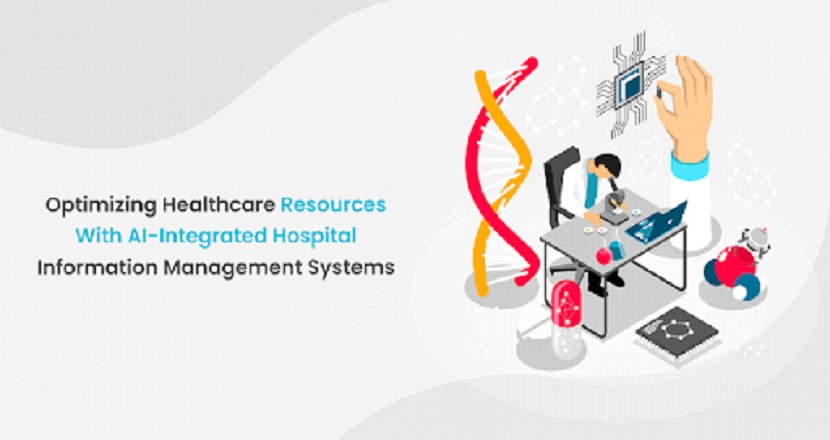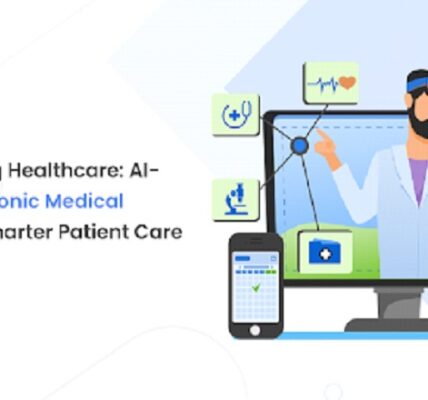Optimizing Healthcare Resources with AI-Integrated Hospital Information Management Systems
Healthcare resource management optimization is being revamped by AI-integrated health management information systems and hospital information management systems. These systems improve decision-making in resource management and consequently operational performance while promoting patient-centredness. From allocating resources for employees to implementing tools for forecasting patient admissions, AI transforms the working capacities of the healthcare industries and tackles new complexities in a constantly rapidly changing healthcare infrastructure.
Understanding Hospital Information Management Systems (HIMS)
A Hospital Information Management System (HIMS) is an enterprise-wide computerized system that assists healthcare providers in managing, storing, and displaying patients’ information as they seek to deliver better and more efficient service. Everything from scheduling an appointment to billing is possible through HIMS with great efficiency and accuracy. High-end HMIS software solutions in India are integrated with capabilities like Artificial Intelligence analytics, real-time data accessibility, and security updates and improvements. These provide facilities to enhance their patient care services and become more efficient in managing their resources and meeting new demands in healthcare easily.
The Role of AI in Healthcare Resource Optimization
Artificial Intelligence (AI) is transforming healthcare resource management, especially hospital information management systems (HIMS). Machine-learning applications, using big data, ensure efficient resource use, facilitate work processes, and improve patient outcomes.
Currently, in HMIS in India, AI is being implemented as a solution to problems such as overcrowding, numerous resource shortages, and low operational efficiency. For example, tentative analysis through the application of AI in healthcare maps out the potential admission of patients in hospitals to allow for staff and bed planning. This minimizes the duration patients have to wait and also improves the quality of the patient’s experience.
That’s why AI is also very useful in inventory management. By identifying consuming trends and anticipating future similar demand, the AI eliminates wastage and guarantees that crucial commodities are always in stock. Other applicability of AI include workforce management such as in designing the staff schedule depending on the patient traffic as well as the skills of the individual staff.
In addition, AI-integrated hospital information management systems improve decision-making by availing the utilization of available resources in real time. Successful certified public accountant implementation will help hospital administrators make correct decisions on the use of valuable resources and enhance operational effectiveness and economies of scale.
There is a rapidly growing need for health care in India, and the inclusion of artificial intelligence into HIMS has shifted. It allows the facilities to manage growing volumes of work, enhance the client’s experiences, and attain operational viability. When optimally designed and deployed, AI-based Hospital Management System holds the key to defining the healthcare organization of tomorrow, today.
Benefits of AI-Integrated HIMS
The application of AI in integrated HIMS is revolutionary and changes the face of what and how hospitals provide to their clients and manage their facilities. Below are some key advantages:
-
Improved Resource Utilization
There is a population of computerized resource schedulers that are enabled by artificial intelligence that try to organize resources with improved effectiveness in HIMS by real-time evaluation of data. Healthcare hospital centers can forecast patients’ admission rates, employ personnel, and have flexible methods to employ the beds in the system hence minimizing wastage and providing optimal use.
-
Cost Reduction
Due to the design of analyzing all the protocols and the time consumption by every repeating action, AI contributes to Operational cost savings. Tasks, such as billing inventory or appointment scheduling are made easy, giving more time to professionals for healing at hospitals. Software manufacturing companies involved in the development of HMIS solutions in India are now using AI to create more effective and affordable solutions for the healthcare industry.
-
Enhanced Patient Outcomes
Machine Learning leads to individual attention being paid to the case of the patients by identifying their/problems in order to enhance their diagnosis and treatment plans. This enhances patient satisfaction and neutral health implications, a trait recognized in the leading best hmis software in india.
-
Real-Time Decision Support
AI helps present data in real time deepening administrators’ and clinicians’ capacity to make sound decisions. In matters of resource allocation for emergencies or development planning for the future, the use of AI guarantees managerial decisions are made having had to consider more data.
-
Streamlined Workflow Efficiency
It trims administration work, for instance through the possibilities to automate work with reports and tracking of compliance. This enhances continuity hence reducing the time that healthcare providers spend on managing their workflow.
Challenges in AI Integration
hospital information management systems become significant candidates for AI integration both in terms of opportunity and challenge. All of these challenges are critical to overcoming when introducing AI-based solutions in healthcare.
There is a potential for data insecurity and privacy to be a key issue in the use of collaborative technologies. Patient information present in the database is often very sensitive and has to be protected to prevent leakage. It remains challenging for even the most superior HMIS software in India because other legal requirements, including HIPAA and India’s data protection regulations, must be met.
Another problem is the high implementation costs of such measures. AI deployment also involves a huge capital investment in system infrastructure, software, and labor force expertise. For many hospitals, especially small ones, these costs can quickly become unaffordable without external lift or subsidies from the government.
Besides, there is a problem of interconnectivity. In other words, implementing AI in Hospital Information Management Systems requires retrieving and processing big data from multiple systems. This environment is non-standardized which creates massive fragmentation and often leads to outdated and disparate systems that do not integrate well, which impacts the result.
Some of the challenges include; resistance to change among healthcare professionals. New technology brings training and changes in organizational culture that make it take time to adapt.
Last, discrimination is evidenced by differentiation in outcomes arising from biased AI models. This can only be solved through constant and ongoing review and readjustment of AI models.
It is necessary to address these barriers so that AI can be optimized in the delivery of HIMS for the potential enhancement of the healthcare system.
Conclusion:
There are notable benefits of applying AI in HIMS in that it increases resource utilization productivity, and efficiency, and better patients’ health status. Through the use of the big data tools of predictive analytics and automation, hospitals will end up improving their operations and functionality. The barriers of cost and data security will also be addressed and this would further enhance the use of the AI solutions to improve the future sustainability, scalability, and patient health service delivery of the healthcare systems.





2 COMMENTS
Comments are closed.